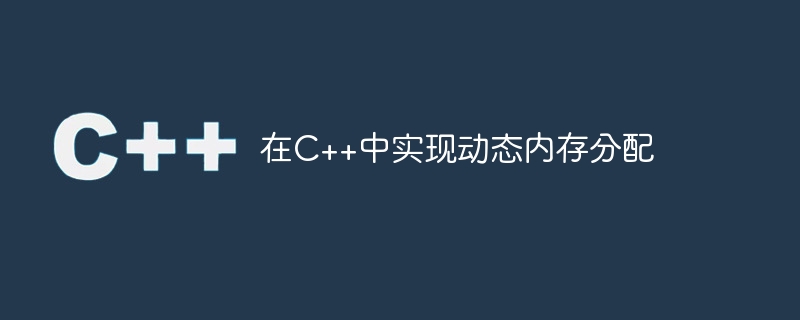

C is a high-level programming language that provides a variety of memory management methods, including static memory allocation and dynamic memory allocation. Static memory allocation allocates memory at compile time, while dynamic memory allocation allocates memory at runtime. In this article, we will focus on how to implement dynamic memory allocation in C.
1. Use the new keyword to allocate memory
In C, use the new keyword to dynamically allocate memory. The basic syntax of the new keyword is as follows:
指针变量 = new 数据类型;
For example:
int *p = new int;
This code will allocate an int type space in the heap and assign its address to the pointer variable p. It should be noted that the memory allocated using the new keyword needs to be released manually, otherwise it will cause memory leaks.
2. Use the delete keyword to release memory
After using the new keyword to allocate memory, you need to use the delete keyword to release the memory. The basic syntax of the delete keyword is as follows:
delete 指针变量;
For example:
delete p;
This code will release the memory space pointed to by the pointer variable p. It should be noted that before releasing the memory, make sure that the space is no longer used, otherwise the program will crash.
3. Use the new[] and delete[] operators to allocate and release multiple memory blocks
In addition to using the new and delete operators to allocate and release a single memory block, you can also use new The [] and delete[] operators allocate and free multiple memory blocks.
The basic syntax of the new[] operator is as follows:
指针变量 = new 数据类型[数量];
For example:
int *p = new int[10];
This code will allocate 10 int type spaces in the heap and add them The address is assigned to the pointer variable p. It should be noted that the memory allocated using the new[] operator also needs to be released manually, otherwise it will cause a memory leak. The basic syntax of the
delete[] operator is as follows:
delete[] 指针变量;
For example:
delete[] p;
This code will release multiple memory spaces pointed to by the pointer variable p. It is also important to note that before releasing multiple memory blocks, make sure that these memory spaces are no longer in use, otherwise the program will crash.
Conclusion
There are many ways to implement dynamic memory allocation in C. Use the new and delete operators to allocate and release a single memory block, and use the new[] and delete[] operators to allocate and free multiple memory blocks. No matter which method is used, you need to pay attention to issues such as memory leaks and program crashes. Memory management must be treated carefully to ensure the normal operation of the program.
The above is the detailed content of Implement dynamic memory allocation in C++. For more information, please follow other related articles on the PHP Chinese website!
 What are the differences between c++ and c language
What are the differences between c++ and c language
 Recommended learning order for c++ and python
Recommended learning order for c++ and python
 Cost-effectiveness analysis of learning python and c++
Cost-effectiveness analysis of learning python and c++
 Is c language the same as c++?
Is c language the same as c++?
 Which is better to learn first, c language or c++?
Which is better to learn first, c language or c++?
 The difference and connection between c language and c++
The difference and connection between c language and c++
 C++ software Chinese change tutorial
C++ software Chinese change tutorial
 Cost-effectiveness analysis of learning python, java and c++
Cost-effectiveness analysis of learning python, java and c++




